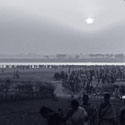Śrīla Bhakti Sundar Govinda Dev-Goswāmī Mahārāj advises the devotees to study the ten offences to the Holy Dhām, prior to Śrī Nabadwīp Dhām Parikramā, March 2008.
This year so many devotees have come from outside of India, and they are very enthusiastic for Nabadwīp Dhām Parikramā. I am very happy. Maybe this is my last year or not, I do not know, but we will join the festival and try not to make offences.
What are the sevā-aparādh, Dhām-aparādh, and Nām-aparādh? It is necessary to know. You already know and are studying the Nām-aparādh, but it is also necessary to know the Dhām-aparādh, and it is also necessary to know the sevā-aparādh. We should try to know the Nām-aparādh, Dhām-aparādh, and seva-aparādh as much as possible because we are always living within the illusory environment. We are not free from illusion, so as much as possible we will try to follow the instructions of sādhu, guru, śāstra. The sādhu—sādhu means Vaiṣṇava—Guru, and scriptures have given some instructions and we shall try to follow that.
——————-
The Ten Offences to the Holy Dhām
(1) Disrespecting Śrī Guru and the sādhus, who are the revealers of the Dhām.
(2) Considering the Dhām temporary.
(3) Harming the residents and visitors of the Dhām, or judging them by their birth.
(4) Residing in the Dhām and engaging in mundane activities.
(5) Earning money by, or making a business of, Deity worship on the pretext of serving the Dhām.
(6) Considering the Dhām equal to places of demigods or material land.
(7) Considering that one can sin (and be absolved) because one resides in the Dhām.
(8) Considering Nabadwīp different from Vṛndāvan.
(9) Criticising the scriptures that glorify the Dhām.
(10) Considering the glories of the Dhām exaggerated praise or imaginary.
